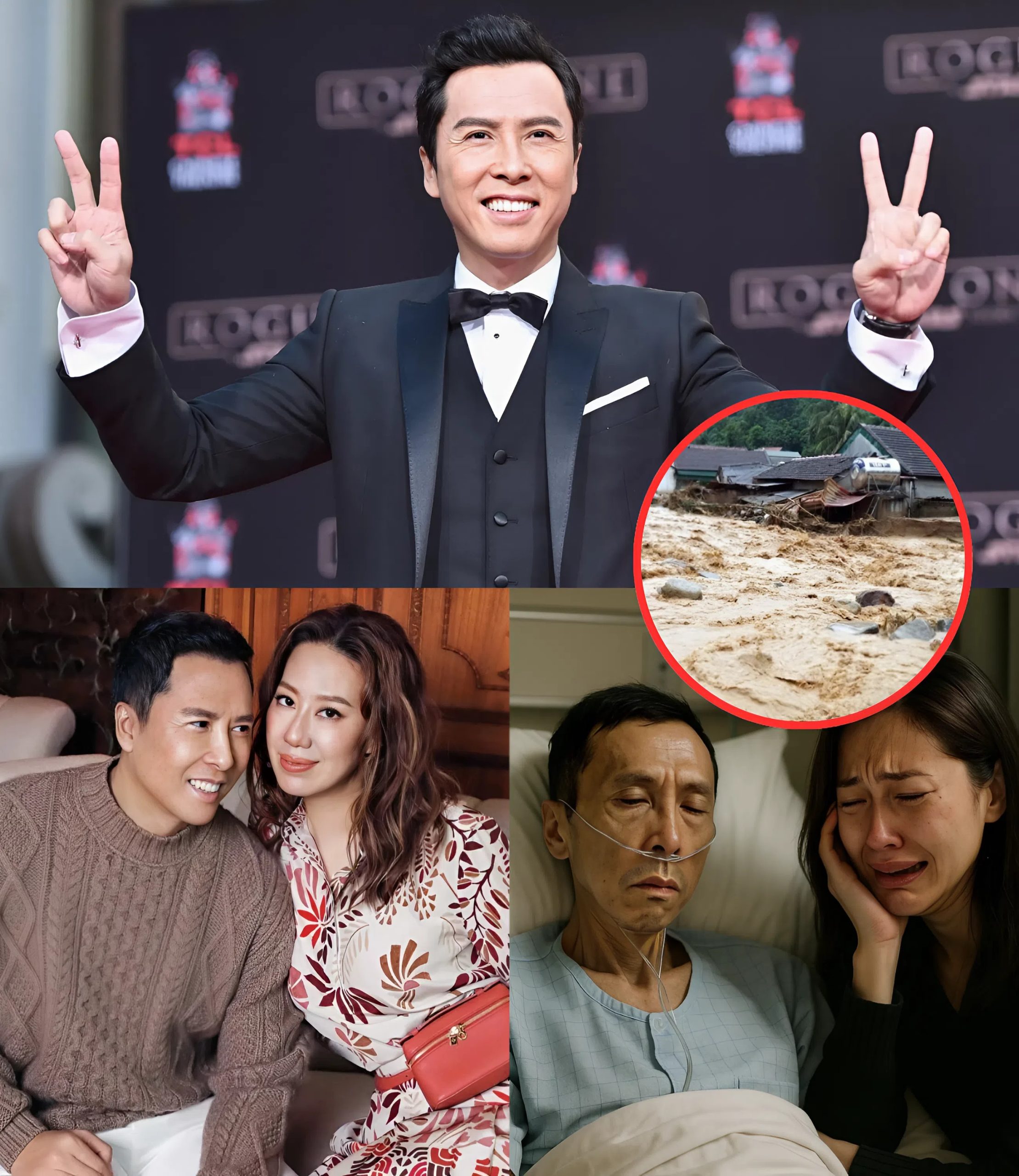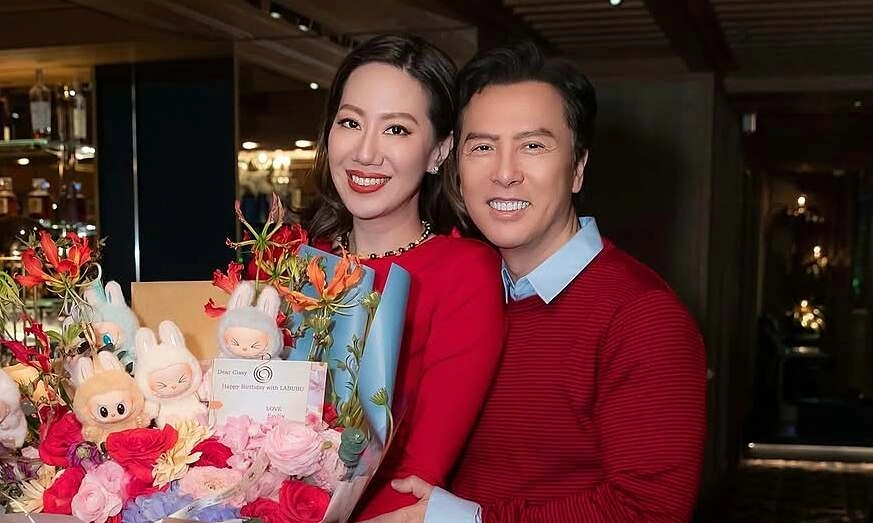The image of Donnie Yen, one of Asia’s most celebrated martial arts stars, comforting victims of the catastrophic Beijing floods captured the hearts of millions. Videos circulated across Chinese and international media showing the Ip Man and John Wick: Chapter 4 actor holding children in his arms, kneeling down to reassure devastated families, and even carrying supplies alongside volunteers. For many, it was the embodiment of cinematic heroism translated into real life.
But just as the world applauded his selfless compassion, a revelation shattered the carefully preserved illusion of invincibility. Yen’s wife, Cissy Wang, broke down in tears and revealed that her husband has been silently battling a serious, long-term illness—a battle he has deliberately kept hidden while continuing to be a source of strength for others.
Her confession was not only heartbreaking but also shocking: the man who symbolized strength, discipline, and resilience on screen has been quietly carrying a burden that few could have imagined.

The Hidden Cost of Being a Hero
For over three decades, Donnie Yen has been the face of martial arts cinema. His speed, power, and precision earned him international recognition and a reputation as one of the greatest action stars of his generation. He is admired not just for his physical skill, but for his discipline and ability to embody cultural pride through his films.
Yet, behind the carefully choreographed fight scenes and relentless work ethic lies a truth that few fans ever suspected. According to Wang, Yen has endured recurring health problems that drain his energy and sometimes leave him unable to perform even basic tasks without pain.
“He doesn’t want anyone to see weakness,” Wang said through tears. “Every time he steps in front of a camera or goes to meet victims of tragedy, he makes sure his smile is real. He always says to me: ‘People are going through worse. My pain is nothing compared to theirs.’ But as his wife, I see how much he suffers when the cameras are gone.”
This revelation exposes the immense pressure placed on global celebrities—especially action stars—who are expected to maintain an image of superhuman strength. For Yen, whose career is built on portraying indomitable warriors, the psychological burden of concealing illness is almost as heavy as the physical toll.
Beijing Floods: A Disaster Met With Compassion
The floods that struck Beijing in recent weeks were among the worst natural disasters to hit the capital in decades. Torrential rains submerged entire neighborhoods, swept away homes, and forced thousands to seek shelter. In this moment of crisis, Yen and Wang traveled to the affected areas, personally distributing aid and offering words of encouragement.
Witnesses described Yen’s presence as electrifying. “He didn’t just show up for photos,” one local volunteer explained. “He carried boxes, held crying children, and spoke to us like family. You could see his compassion.”
What no one realized at the time was that while he gave everything to lift the spirits of strangers, Yen was simultaneously fighting his own private battle against illness. The duality is both inspiring and tragic—an action hero performing his most important role, not on screen, but in life.
The Burden of Secrecy in Celebrity Culture
Yen’s hidden illness raises uncomfortable questions about the nature of celebrity in modern culture. Stars are often trapped by the expectation of perfection. For an action hero, especially one who has represented Chinese pride on the global stage, admitting vulnerability could be seen as damaging to both career and image.
This secrecy, however, comes at a cost. By suppressing his pain, Yen has carried an emotional burden alongside his physical struggles. Cissy Wang’s tearful confession reveals a family dynamic defined by love, sacrifice, and worry. She described nights when Yen would return home from grueling shoots, collapse from exhaustion, yet still refuse to let his children see weakness.
“Donnie has always lived for others—for his fans, for his family, for the people he helps,” she said. “But I’ve begged him to also live for himself.”
Public Reaction: An Outpouring of Support
The revelation immediately ignited a storm on social media. On Weibo, hashtags about Yen’s illness trended within hours, with fans posting heartfelt messages of encouragement.
-
“Even heroes get tired. Donnie, thank you for fighting for us all these years. Now let us fight for you,” one user wrote.
-
Another commented: “His movies taught us resilience. Now it’s time for him to feel the same love from us.”
International fans also flooded platforms like Twitter and Instagram with tributes, sharing clips from Ip Man alongside personal stories of how Yen’s films inspired them through difficult times. The overwhelming response highlights a critical shift: in an era where vulnerability is often stigmatized, Yen’s silent struggle has instead humanized him further.

The Psychology of Strength and Vulnerability
What makes Yen’s story resonate so deeply is the paradox it embodies: a man celebrated for invincibility is, in reality, fragile. Yet, that fragility does not diminish his legacy—it enhances it.
Psychologists often emphasize that true strength is not the absence of weakness, but the ability to persist despite it. In this light, Yen’s decision to continue supporting others, even while privately suffering, elevates him beyond the two-dimensional hero archetype. He becomes something more profound: a reminder that courage and compassion thrive not in perfection, but in perseverance.
The Mystery of His Illness
Neither Wang nor Yen has disclosed details about his condition, sparking widespread speculation. Is it an injury sustained during years of punishing martial arts stunts? A chronic illness that has progressively worsened? Or something more serious that threatens his long-term health?
Insiders in the film industry suggest that Yen’s demanding stunt work over decades has left him with chronic pain and possibly more severe complications. He has previously admitted to breaking bones and sustaining injuries during filming, but has never indicated anything beyond the physical wear-and-tear of an action star.
By refusing to name the illness, the family may be attempting to protect Yen’s privacy while also avoiding unnecessary panic among fans. Still, the ambiguity only fuels the sense of tragedy and uncertainty surrounding his future.
What the Future Holds
Despite his struggles, Yen reportedly has no plans to retire. His upcoming projects remain in development, though production schedules are said to have been quietly adjusted to accommodate his health. Sources close to the actor describe him as fiercely determined to keep working, even if it means enduring discomfort.
“Donnie believes his purpose is to inspire,” Wang explained. “He wants people to know that even when you face battles no one can see, you can still be a light for others.”

This attitude reflects the philosophy at the core of Yen’s career: martial arts not just as physical combat, but as a way of life rooted in resilience, discipline, and service.
A Legacy Redefined
The revelation of Yen’s hidden illness does not tarnish his legacy—it deepens it. Fans no longer see only the invincible fighter on screen, but the human being behind the roles: a husband, a father, and a man who quietly chose to endure pain so that others could feel hope.
For the victims of the Beijing floods, his presence was a lifeline. For his fans, his confession—delivered through his wife—was a reminder that strength comes in many forms. And for his family, it is a call to balance his public duty with personal well-being.
As one fan movingly put it: “Donnie Yen showed us what true martial arts spirit means—not winning every fight, but facing every struggle with dignity.”
Conclusion: The Human Face of a Legend
The story of Donnie Yen’s hidden illness is both heartbreaking and inspiring. It forces us to confront the uncomfortable reality that even the strongest among us carry unseen battles. Yet it also redefines what it means to be a hero.
By standing with flood victims while fighting his own private war, Yen has proven that heroism is not measured by physical power alone, but by compassion, endurance, and the willingness to give even when you are running on empty.
In revealing his vulnerability, Yen has not diminished his legend—he has elevated it. He is no longer just the martial arts superstar; he is a symbol of resilience in the truest sense.
For millions who watched him comfort strangers in Beijing, and for countless more who now know the hidden cost of his strength, Donnie Yen’s story will endure not just as cinema, but as a testament to the human spirit.
